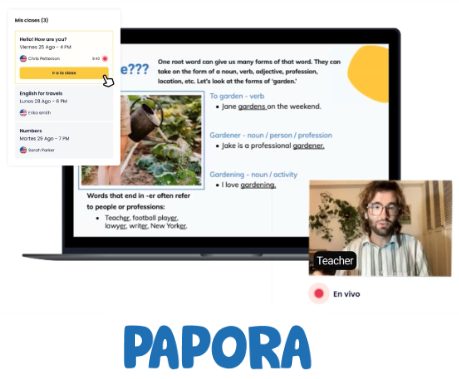You've probably heard phrases like "learn English in just 7 days" or "improve your English in no time!" But is it really possible?
The speed of mastering English varies from person to person and from several factors. It's estimated that it takes between 500 and 1,000 hours of study to reach an intermediate level. With consistent study, you could reach a near-native level in about 5 years.
Factors that affect the time it takes to learn English
Your native language and the languages you speak
The process of learning English can be easier if your native language, or another language you already know, has similar structures.
In general, Spanish and English have similar grammatical structures, which can be helpful. Furthermore, English requires fewer conjugations for verbs.
Your English Goal
Why is learning English important? Everyone has a different motivation for mastering this language, from career growth to travel or study abroad.
Understanding why English opens opportunities helps clarify your goal, and when your purpose is clear, motivation stays stronger, and progress becomes more consistent over time.
The Study Method
A fundamental factor that can undoubtedly determine how quickly you learn English fluently is the method you use.
Determining an effective way to learn English will reduce your study time and help you achieve your goal quickly.
Why wait years when you can accelerate your progress?
Learning English can be challenging, but with Papora's method, you can improve quickly while having fun.
Start now

Where you learn English
Where and how you learn English determines how long it takes to master it.
Online schools like Papora offer classes with native-level teachers and constant practice, which can be effective. Additionally, minimizing the use of English learning plugins like Duolingo and practicing more with classmates or friends can improve your progress.
The Study Time You Dedicate
Malcolm Gladwell, renowned sociologist and journalist, wrote in one of his books that to become an expert in a subject or language requires 10,000 hours of practice.
Many people forget that something as simple as organization can help you achieve your goals in less time. This applies to languages or any area of your personal life.
Your current English level
The level is essential for estimating the time required to reach fluency.
According to the CEFR, an approximate number of additional practice hours can be determined. For example, an intermediate-level student (B1) might need around 600 more hours of practice to reach an advanced native-level student (C2).
These estimates help learners understand English learning timelines rather than guessing their progress from day to day.
How many levels of English are there?
The Common European Framework of Reference for Languages (CEFR) is a global classification of English proficiency levels, divided into seven levels:

How long does it take to learn English?
Various studies have been conducted to determine how long it takes to learn English, yielding the following results for the CEFR levels:
| Level | Level | Hours Needed |
| A0 | A1 | 70 |
| A1 | A2 | 150 |
| A2 | B1 | 300 |
| B1 | B2 | 200 |
| B2 | C1 | 200 |
| C1 | C2 | 200 |
“It's very difficult to talk about learning a language in a specific timeframe. There's a big difference in how often you learn a language. Of course, if you learn a language every day for several hours over a period of months, the results will be different than if you dedicate just one hour a week to learning a language. Let's not talk about specific dates, but rather about the regularity of your classes.”
Unlock your English potential now with Papora
Learning English is an exciting, daily experience. Discover how to integrate English into your everyday life with unlimited live classes.
Try a class

Tips to learn English faster
Identify your prior knowledge
Assess your current level of English to determine which areas you need to improve. This will allow you to focus on your weaknesses and optimize your study time. Make a list of the main areas to work on.
“Reduce the words you already know well and push out the ones you haven't used in a while. The key is to maintain them and do them often.”
Practice and Dedication
The key to mastering any language is consistent practice and dedication. Set realistic goals and commit to studying regularly. Discipline and habits are key.
Set a schedule for learning English
Plan regular study sessions into your daily routine. Setting aside a specific time for English learning will help you maintain consistency and progress. Even a simple roadmap for your first 3 months of English study can make a big difference in how steady your progress feels.
“If you don't have time, I encourage you to find and schedule 20-minute learning slots into your day. The trick is to be consistent and disciplined with that time. Try different times of day to see what works best for you, and then stick to that schedule.”
Use a variety of resources
Combine different learning resources, such as books, exercises, songs, online videos, and classes with native teachers. This will provide you with a variety of approaches to strengthen your language learning, helping you practice many useful topics such as the second conditional.
Immerse yourself in the language
If you have the opportunity, traveling to a native English-speaking country can be an invaluable experience. Total immersion constantly exposes you to the language and forces you to practice it in real-life situations.
“My advice is to come to a new country and explore it from there. If your goal is to visit museums, you might want to learn the vocabulary for buying tickets and requesting a tour guide, etc.”
Don't be afraid to make mistakes
Accept that making mistakes is part of the learning process. Don't be discouraged by mistakes and keep practicing with confidence. This approach, along with other fast tips for English fluency, can accelerate your progress and help you build the skills you need to communicate naturally.
Use the best method: Learn English with Papora
Papora offers an interactive and easy-to-use system for learning English, and you can take classes from home, whenever you want.

✅ With Papora, you'll learn English like a game.
✅ Its system allows you to watch unlimited live classes with native-level teachers who will teach you the language through spoken and immersive language learning, supported by real-life situations.
✅ With the self-guided course of over 500 lessons, you can learn freely in a fun and effective way at your own pace.
✅ You can certify your English level from A1 to C1 and enhance your resume.
Discover your level and make English an essential part of your life
At Papora, you have the freedom to study at your own pace and on your own schedule. Find your level and start now!
Click here to start

Frequently asked questions about how long it takes to learn English
Learning English isn't as difficult as most people think. If you're dedicated and get the right help, you'll be able to master the language quickly and level up. Courses like Papora are ideal for achieving this goal, thanks to their unique, interactive system.
English is one of the most widely spoken languages in the world, so speaking it fluently can open up many opportunities for you in your studies and in the workplace. Depending on your level of English, you'll be able to communicate anywhere in the world without difficulty.







